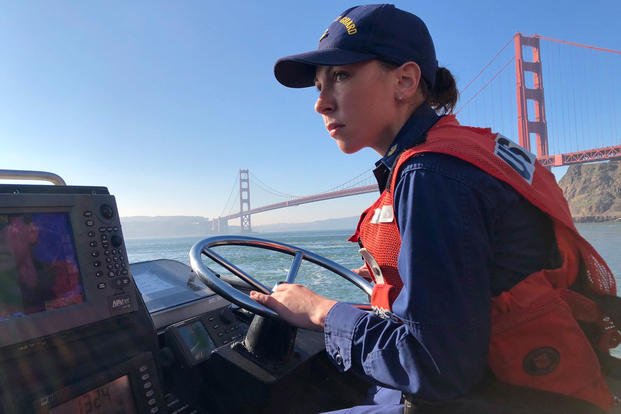A week before releasing results of a study on retaining women in the Coast Guard, the service's top leaders said they will institute a policy to better support families during parental leave and are considering changing weight standards they say disproportionately affect females.
Commandant Adm. Karl Schultz also told reporters during a briefing Thursday that the service plans to study minority retention in order to grow -- and keep -- diversity in the ranks.
The Coast Guard last year hired Rand Corporation to explore why many women leave the Coast Guard after their first enlistment or officer obligation. In the first five years, Schultz said, women and men stay in the service at the same rates, but from after that, and through the 14th year, female retention drops, with up to a 14 percent gap between gender.
To address one retention concern, Schultz said members of the Coast Guard Reserve will now be used to backfill members while they are on maternity, convalescent or caregiver leave.
While the details have not been finalized, Schultz said he wanted men and women in the Coast Guard to see success in the service and also be successful parents and caregivers.
"There is policy work that needs to go into it. But ... I want the Coast Guard to be an employer of choice. I want the Coast Guard to be a place where you see a future, you see opportunity."
The service's top leaders said that because the Coast Guard is so small and its members are scattered across the United States and abroad in remote locations, there are no replacements for members -- men and women -- when they take leave related to childbirth, caregiving and convalescence.
The proposal to use Coast Guard Reserve members in their places is designed to ease anxiety and ensure that members take their full allotment of leave, Schultz said.
"I want men and women to see success as a Coast Guardsmen and success as a parent," he said.
The Coast Guard is 14.6 percent women and 17 percent persons of color, including 5.9 percent African-American. To address what Schultz called a disparity between the service and the general population regarding diversity, the Coast Guard plans to commission a study on retaining underrepresented minorities, similar to the report it will release next week.
It also is examining its tattoo restrictions, policies that prevent single parents from enlisting and physical standards based on body mass index that limit recruitment and retention.
Master Chief Petty Officer of the Coast Guard Jason Vanderhaden explained that the Coast Guard's physical standards are largely based on body mass index, a measurement that doesn't account for fitness, ability to do one's job, muscle mass and overall body composition.
Acknowledging that Coast Guard men and women must maintain a level of fitness to perform their jobs, he said that the current BMI restrictions could be adjusted to ensure that the service retains those who are qualified and perform well.
"We've heard from women who said they left the service because they had so much anxiety every April and October [when the Coast Guard measures]. They were starving themselves or doing other things," Vanderhaden said.
Again, the service has yet to develop the policy but Schultz said the leadership team is exploring these "forward-leaning policy changes to recruit and retain a workforce reflective of the nation we serve."
After the commandant's speech, Ensign Abby Mann said she was excited about Schultz's proposals. A deck watch officer on the Fast Response Cutter USCGC Benjamin Bottoms, she called the Reserve replacement proposal a "great idea."
"I really like what he said to retain women ... right now, when you leave, it can be a real burden on a unit. If you knew someone was stepping in, it would give you more flexibility and definitely relieve anxiety."
-- Patricia Kime can be reached Patricia.Kime@Military.com. Follow her on Twitter at @patriciakime.













